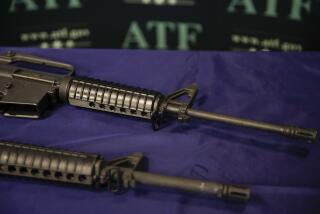U.S. Disputes Rhino-Ammo Claims, Clears It for Sale : Weaponry: It’s just another hollow-point bullet, regulators say after tests. Agency doubts that another design, the Black Rhino, even exists.
- Share via
HUNTSVILLE, Ala. — Federal regulators have decided to approve the sale of the Rhino-Ammo fragmenting bullet after tests showed the notorious ammunition is no different from other hollow-point bullets.
The U.S. Bureau of Alcohol, Tobacco and Firearms in Washington test-fired less than a dozen of the new bullets and will license them within 60 days, bureau spokesman Tom Hill said Friday.
“According to our tests, it’s no different from any other hollow-point bullets on the market, and as long as it’s not armor-piercing, which it’s not, we have no problem licensing its manufacture,” he said.
David Keen, the Huntsville chemist who invented Rhino-Ammo, had claimed that the bullets could cause catastrophic wounds and instantaneous death.
The bullets are made of lead pellets in metal-encased plastic.
“Hollow-point ammunition expands as it hits a target, and I don’t know that Mr. Keen’s ammunition expands as much as he says it does,” Hill said.
*
Keen has declined comment since a Dec. 29 broadcast on ABC-TV’s “Nightline,” during which the bullet was put through its first public demonstration.
The rounds did not do what Keen claimed they could. However, he said the bullets ABC tested were only “pre-production rounds.”
A message left Saturday for Keen was not returned.
Keen had also promoted another fragmenting bullet he developed, Black Rhino, which he had claimed could also pierce body armor.
However, the bureau was told that no Black Rhino bullets were available for testing.
“We don’t think the Black Rhino exists because no one has seen the bullets,” Hill said.
The bullets had been criticized by police groups that feared they would wind up in criminals’ guns.
More to Read
Sign up for Essential California
The most important California stories and recommendations in your inbox every morning.
You may occasionally receive promotional content from the Los Angeles Times.













